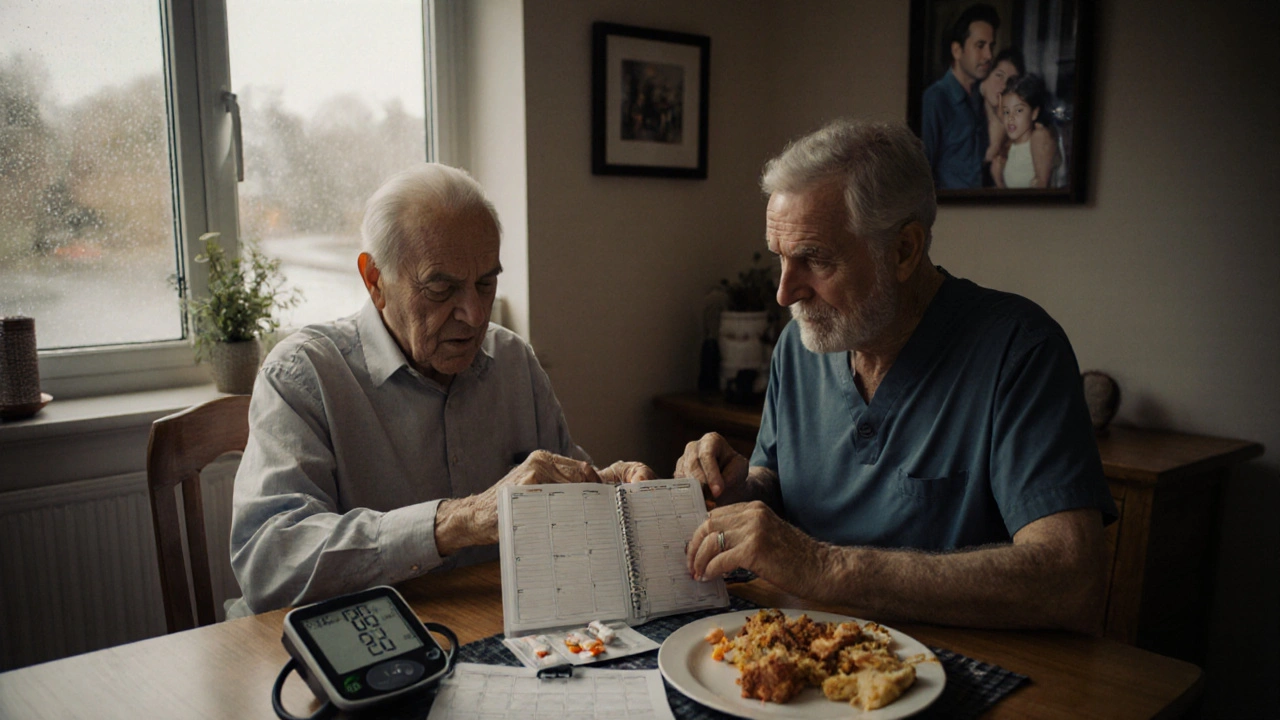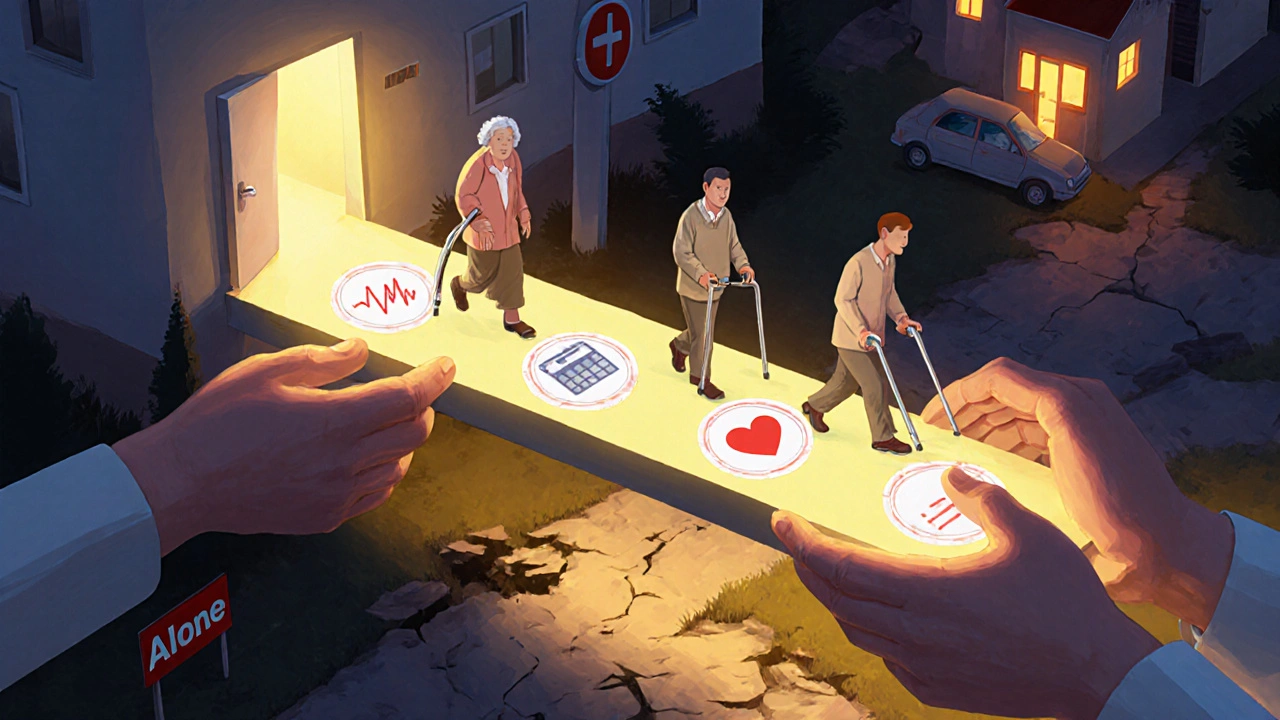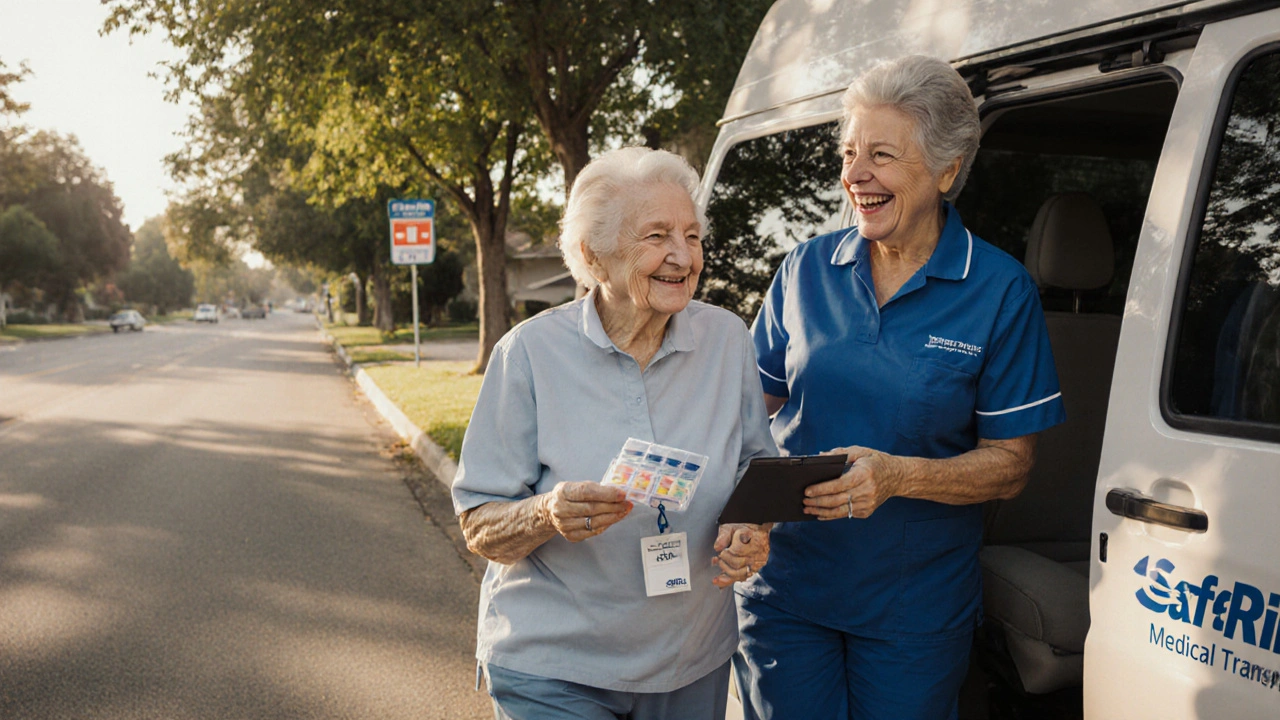Every year, over 1 in 5 Medicare patients in the U.S. end up back in the hospital within 30 days of discharge. That’s not just a statistic-it’s a family waking up to an ambulance siren, a老人 struggling to reach the bathroom alone, or a diabetic patient missing their insulin because no one checked in. These readmissions aren’t always about medical failure. Often, they’re about logistics. No one to drive them to follow-up appointments. No one to help them take pills on time. No one to notice the swelling in their legs or the confusion in their voice before it turns into an emergency.
Medical escort services are filling that gap. Not glamorous. Not flashy. But quietly saving lives by making sure patients don’t fall through the cracks after leaving the hospital.
What Exactly Is a Medical Escort Service?
A medical escort service isn’t a taxi with a stretcher. It’s a trained professional who accompanies a patient during transport and provides basic medical oversight. These aren’t paramedics, but they’re not just drivers either. They’re trained in vital signs monitoring, medication reminders, fall prevention, and recognizing early signs of deterioration. They ride with patients to dialysis centers, cardiac rehab, wound care clinics, and even grocery stores if nutrition is part of the recovery plan.
Think of them as a bridge between hospital care and home care. While nurses visit weekly, and family members work full-time jobs, medical escorts are the consistent presence between those points. They’ve been used for years in the U.S., Canada, and parts of Europe. Now, they’re gaining traction in Australia, especially in rural and aging communities.
Why Do Patients Get Readmitted After Leaving the Hospital?
Hospitals discharge patients when they’re stable-not when they’re fully healed. That’s the reality. But stability doesn’t mean safety. Here’s what actually goes wrong:
- Patients forget or mix up medications-especially when they’re on 5+ new prescriptions after surgery.
- No one checks their incision site, so an infection goes unnoticed until it’s severe.
- They can’t get to their follow-up appointment because they don’t drive, don’t have a car, or can’t afford a taxi.
- They’re too weak to cook, so they eat junk food, which spikes blood sugar or blood pressure.
- They feel dizzy or confused but don’t tell anyone, thinking it’s just “old age.”
A 2024 study from the Australian Institute of Health and Welfare found that 47% of readmissions within 30 days were linked to lack of post-discharge support-not medical complications. That’s the key. The problem isn’t always the illness. It’s the lack of someone watching.
How Medical Escorts Reduce Readmissions
Medical escort services cut readmission rates by addressing the real, daily risks patients face after leaving the hospital.
Take Mrs. Henderson, 78, discharged after a hip replacement. She lived alone. Her daughter worked nights. The hospital gave her a list of meds and told her to call if she felt pain. Two days later, she fell trying to get to the bathroom. No one was there to help. She ended up back in the ER with a fractured wrist.
If she’d had a medical escort: they’d have driven her to her first physio session, checked her wound daily, reminded her to take her blood thinner, and noticed her balance was off before the fall. That’s not magic. That’s basic human support.
Studies show hospitals using medical escort programs see readmission drops of 25-40%. One pilot in Western Australia reduced 30-day readmissions for heart failure patients by 32% over six months. The escorts didn’t change the meds. They didn’t perform surgery. They just showed up.
What Services Do Medical Escorts Actually Provide?
Medical escorts offer more than rides. Here’s what a typical service includes:
- Transport to and from medical appointments (dialysis, imaging, clinics)
- Medication management: organizing pill boxes, reminding patients when to take doses
- Vital sign checks: blood pressure, oxygen levels, heart rate-before and after appointments
- Fall risk assessment: watching how patients walk, sit, stand
- Basic nutrition support: helping prepare simple meals or ensuring they’ve eaten
- Communication with family or doctors: sending brief updates if something changes
They don’t give injections. They don’t change catheters. But they’re trained to spot when something’s wrong-and to call for help before it becomes a crisis.
In Perth, services like HealthLink Escorts and SafeRide Medical Transport now offer bundled packages: three rides per week with daily check-ins for 30 days after discharge. Many are covered by Medicare Advantage plans, private health insurers, or aged care packages.

Who Benefits Most From Medical Escort Services?
Not everyone needs one. But these groups see the biggest payoff:
- Seniors over 70 living alone
- Patients with multiple chronic conditions (diabetes, COPD, heart failure)
- Those recovering from surgery, especially hip, knee, or abdominal procedures
- Patients with cognitive decline or mild dementia
- People without reliable family or caregiver support
It’s not about age. It’s about risk. A 65-year-old with no other health issues might not need it. A 72-year-old with diabetes, arthritis, and no one to check on them? That’s the person who needs the escort.
How to Get a Medical Escort Service
It’s easier than you think. Here’s how:
- Ask your hospital discharge planner. Most now have partnerships with local escort services.
- Call your local Aged Care Assessment Team (ACAT) if you’re over 65. They can arrange funding.
- Check with your private health insurer-some now cover post-discharge transport as part of recovery packages.
- Search for “medical escort services [your city]” online. Look for providers with trained staff, not just drivers.
- Ask for a trial: many offer a single ride to test the service before committing.
Don’t wait until you’re back in the hospital. If you’re worried about someone going home alone after discharge, start the conversation now.
Costs and Insurance Coverage
Costs vary by location and service level. In Australia, a single transport with monitoring typically runs $80-$150. A full 30-day package with three rides and daily check-ins might cost $1,200-$2,000.
But here’s the math: one hospital readmission costs an average of $12,000 in Australia. Even if insurance covers most of it, the system still pays. And the patient? They lose weeks of recovery, sleep, dignity.
Medicare doesn’t cover transport directly-but many Medicare Advantage plans do. Private insurers like HCF, Medibank, and nib now include medical escort coverage in some higher-tier plans. Aged Care Home Care Packages (Level 2 and above) often fund these services too.
Some local councils and charities offer subsidies for low-income seniors. Ask your local community health center.

What to Look for in a Medical Escort Provider
Not all services are equal. Here’s what to check:
- Staff training: Are they certified in first aid, CPR, and medication awareness?
- Background checks: Do they screen for criminal history?
- Communication: Can they send updates to family or doctors? Do they use secure apps or phone logs?
- Vehicle safety: Are vehicles equipped with seatbelts, ramps, and oxygen ports if needed?
- Availability: Can they respond on weekends or holidays?
Ask for a reference. Talk to someone who’s used the service. If they say, “They showed up on time and actually listened,” that’s a good sign.
Real Impact: Stories From the Frontlines
John, 81, had a pacemaker implanted. He lived alone in Bunbury. After discharge, he didn’t go to his follow-up because he was scared to drive. He skipped his meds. Two weeks later, he collapsed. His daughter found him. He spent 10 days back in hospital.
After that, his daughter signed him up with a local medical escort. They picked him up every Monday and Thursday for check-ups. They reminded him to take his blood thinners. They noticed his feet were swollen and called his GP. Turns out, it was early heart failure. He got treatment before it got worse.
“They didn’t fix him,” his daughter said. “But they kept him safe until his body could heal.”
That’s the point.
Why This Matters More Than Ever
Australia’s population is aging fast. By 2030, one in four people will be over 65. Hospitals are already stretched thin. Readmissions are a growing financial and human burden.
Medical escort services aren’t a luxury. They’re a necessary part of modern healthcare. They’re the quiet, reliable hands that turn discharge from a risk into a step toward recovery.
It’s not about replacing family. It’s about supporting them. It’s about giving patients dignity-not just medical care, but human care.
If you’re worried about someone leaving the hospital alone, ask: Who’s going to make sure they’re okay? If the answer is “no one,” then it’s time to call a medical escort service.
Are medical escort services only for elderly patients?
No. While seniors are the most common users, anyone recovering from surgery, illness, or injury who lacks support at home can benefit. This includes younger patients with mobility issues, neurological conditions, or those recovering from mental health hospitalizations. The key factor is whether they need help with transportation, medication, or monitoring after discharge-not their age.
Can medical escorts administer medications?
They can remind patients to take their meds and help organize pill boxes, but they are not licensed to give injections or IV medications. Their role is observation and support, not clinical intervention. If a patient misses a dose or shows signs of adverse reaction, they’ll contact a nurse or doctor immediately.
How do I know if my loved one needs a medical escort?
Look for these signs: They’ve had a hospital stay before, they live alone, they have trouble remembering meds, they’ve fallen recently, or they’re confused about their discharge instructions. If family can’t be there daily, or if the patient seems overwhelmed, a medical escort is a smart safety net-not a last resort.
Are medical escort services covered by Medicare in Australia?
Standard Medicare doesn’t cover transport. But many private health insurers and Medicare Advantage plans do. Aged Care Home Care Packages (Level 2 and above) often include transport services. Check with your insurer or contact My Aged Care to see if you qualify for funding.
Can medical escorts help with non-medical tasks like grocery shopping?
Yes, if it’s part of the recovery plan. Some services include help with light errands like picking up prescriptions, buying groceries, or preparing simple meals-especially if nutrition affects healing. This is usually included in longer-term packages and must be agreed upon in advance. It’s not just about getting to the clinic-it’s about making sure the home environment supports recovery.
Medical escort services don’t promise miracles. But they do promise presence. And sometimes, that’s all it takes to keep someone out of the hospital.
